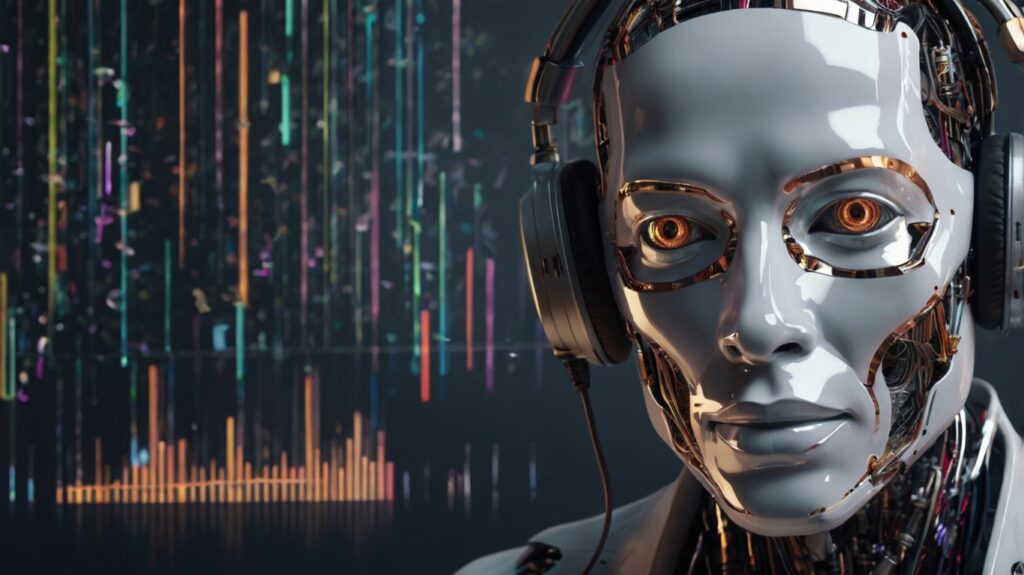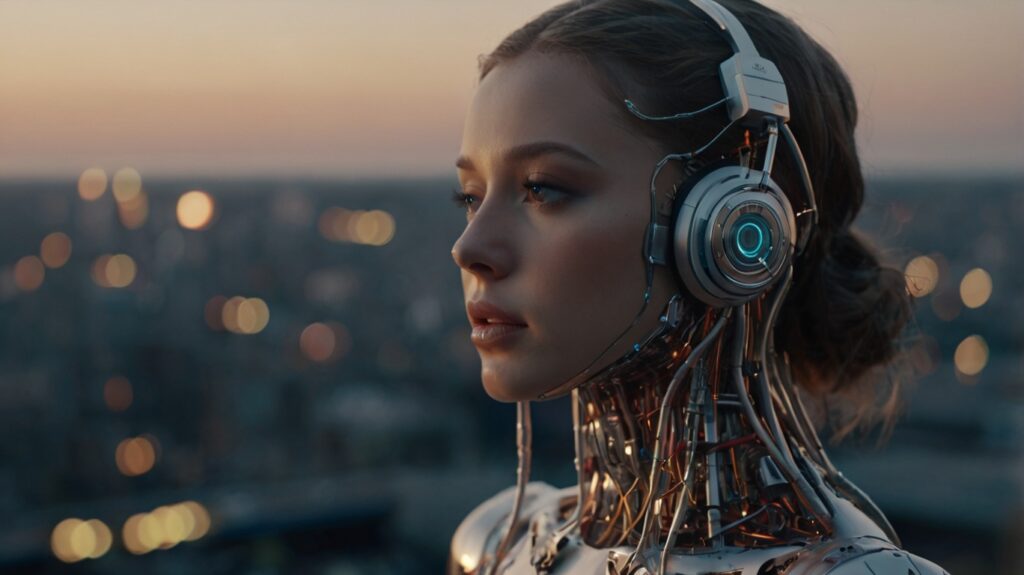The world of music is on the cusp of a transformative era. Artificial intelligence (AI) is rapidly changing how music is created, experienced, and even composed. From sparking inspiration for human artists to generating entire pieces on its own, AI is making waves in the music industry. This blog post delves into the fascinating world of AI for Music, exploring its capabilities and the diverse use cases that are shaping the future of sound.

Table of Contents
ToggleDemystifying AI for Music
AI for Music encompasses a range of technologies that leverage machine learning algorithms to interact with music in profound ways. These algorithms are trained on massive datasets of existing music, allowing them to identify patterns, predict musical sequences, and even generate entirely new compositions. Here’s a breakdown of the core functionalities of AI in the music domain:
- Music Generation: AI can create original musical pieces, from melodies and harmonies to rhythms and instrumentation. Users can provide prompts or specific styles as input, and the AI generates music that adheres to those guidelines.
- Music Style Transfer: Take an existing piece of music and transform it into a different genre or style. Imagine a ballad turned into a high-octane rock anthem, all powered by AI.
- Music Recommendation: AI algorithms analyze your listening habits and recommend new music that aligns with your preferences. This personalized approach is revolutionizing music streaming services and helping listeners discover hidden gems.
- Automatic Transcription: AI can transcribe audio recordings into musical notation, a tedious task for human musicians. This makes it easier to preserve and share music, especially from historical recordings.
- Music Composition Assistance: AI can act as a songwriting partner, suggesting chord progressions, lyrical ideas, or even providing melodic variations. This empowers human composers to overcome creative blockages and explore new avenues in their music.

Unleashing the Power of AI Music Generators
AI Music Generators (or AI Song Generators) are a particular area of AI for Music that’s gaining significant traction. These user-friendly platforms enable anyone, from seasoned musicians to complete novices, to create music.
Here’s a glimpse into the exciting use cases of AI Music Generators:
- Content Creators: YouTubers, podcasters, and filmmakers can leverage AI to generate custom soundtracks, intros, and outros that perfectly complement their content. This eliminates the need for expensive licensing fees or hiring composers.
- Musicians and Songwriters: AI can be a valuable tool for overcoming writer’s block, sparking creative inspiration, and experimenting with different musical styles. Imagine having an AI co-writer who can suggest innovative chord progressions, melodic hooks, or even complete song sections!
- Music Education: AI-powered music generators can provide a fun and engaging way for music students to explore music theory, experiment with different instruments and styles, and develop their compositional skills.
- Accessibility and Democratization of Music Creation: AI Music Generators empower anyone, regardless of musical training or experience, to create music. This opens doors for new voices and perspectives to emerge in the music landscape.
Beyond Generation: The Evolving Landscape of AI in Music
The capabilities of AI in the music world extend far beyond just generating music. Here are some fascinating emerging areas of application:
- Music Restoration: AI can be used to restore and enhance the quality of degraded or damaged audio recordings. This can breathe new life into historical recordings and preserve them for future generations.
- Personalized Music Experiences: Imagine an AI system that dynamically adjusts the music you’re listening to based on your mood, activity level, or even the time of day. This level of personalization can create a truly immersive and tailored music experience.
- AI-powered Live Performances: AI can be used to create interactive and dynamic live performances by manipulating audio and visuals in real-time. This opens doors for innovative and engaging concert experiences.

The Ethical Considerations of AI Music
As with any powerful technology, AI for Music raises ethical questions that need to be addressed. Here are some key considerations:
- Ownership and Copyright: Who owns the music created by AI? Should it be attributed to the programmer, the user, or the AI itself? Clear legal frameworks need to be established to address these complexities.
- The Future of Human Musicianship: Will AI render human musicians obsolete? It’s more likely that AI will act as a collaborator, augmenting human creativity and pushing the boundaries of musical expression.
- Algorithmic Bias: AI algorithms are trained on existing data, which can perpetuate biases. Ensuring fairness and diversity in AI-generated music is crucial.
The Human Touch: The Essential Ingredient in AI Music
While AI possesses remarkable capabilities in music generation and manipulation, it’s important to remember that the human touch remains an essential ingredient. Here’s why:
- Curation and Emotion: AI can generate countless musical variations, but choosing the right elements to evoke specific emotions or create a cohesive listening experience is where human artistry shines. A skilled musician can curate the AI-generated pieces, selecting the most impactful parts and arranging them in a way that resonates with listeners.
- Musical Nuance and Storytelling: Music is a powerful storytelling medium. While AI can create interesting melodies and rhythms, capturing the subtle nuances of human emotion and crafting a compelling narrative through music is a strength unique to human composers.
- Live Performance: The energy and connection of a live performance is a cornerstone of the music experience. While AI can be used to create dynamic elements in live shows, the raw energy and improvisational skills of human musicians are irreplaceable.

AI as a Tool for Empowerment
Instead of viewing AI as a potential replacement, it’s far more empowering to see it as a powerful tool that can enhance human creativity in several ways:
- Breaking Creative Blocks: Hitting a wall while composing? AI can suggest unexpected melodic turns or chord progressions, helping musicians overcome writer’s block and explore new sonic avenues.
- Democratizing Music Creation: AI Music Generators with user-friendly interfaces allow anyone to experiment with music creation, regardless of their musical background. This fosters a more inclusive musical landscape and opens doors for new talent to emerge.
- Expanding Musical Horizons: AI can analyze vast amounts of musical data, identifying patterns and connections that might elude human ears. This can inspire musicians to experiment with unfamiliar genres and styles, leading to groundbreaking musical fusions.
The Future Belongs to Collaboration
The future of music lies in a collaborative space where human creativity and AI’s computational power work in tandem. Imagine AI-powered tools that can:
- Adapt to a Musician’s Style: An AI that can analyze an artist’s existing music and generate sounds and melodies that seamlessly complement their unique style.
- Provide Real-time Feedback: AI algorithms that can offer feedback on a musician’s composition in real-time, suggesting improvements to harmony, rhythm, or arrangement.
- Personalized Music Education: AI-powered tutors that can tailor music lessons to an individual’s learning style and pace, making music education more engaging and effective.
These are just a few glimpses into the exciting possibilities that await us at the intersection of AI and Music. As this technology continues to evolve, the future soundscape promises to be a rich tapestry woven with the threads of human ingenuity and artificial intelligence, creating a truly transformative musical experience for generations to come.

Conclusion: A Symphony of Innovation
The integration of AI into music is not a replacement for human creativity, but rather a powerful tool to expand its horizons. AI can spark inspiration, streamline workflows, and even generate entirely new musical experiences. As AI for Music continues to evolve, the boundaries between creator and technology will blur, fostering a new era of collaborative musical expression. The future soundscape promises to be a symphony of innovation, where human ingenuity and artificial intelligence work in tandem to craft music that is both deeply personal and universally captivating.
This exciting journey has just begun. Are you ready to be a part of the AI-powered music revolution? Share your thoughts and predictions about the future of AI for Music in the comments below!
FAQs (Frequently Asked Questions)
AI can generate music that is surprisingly complex, original, and even emotionally evocative. While it may not yet replicate the nuanced creativity of a human artist, AI music is constantly improving and can be a valuable tool for sparking inspiration and exploring new sonic territories.
Highly unlikely! AI is more likely to act as a collaborator, assisting musicians with composition, production, and performance. Human creativity and emotional connection will always be essential aspects of music.
Several user-friendly AI Music Generators are available online. These platforms often require minimal musical experience and allow you to experiment with different genres, instruments, and moods.
The copyright ownership of AI-generated music is a complex legal issue that is still evolving. It’s important to check the specific terms of use for the AI platform you’re using.
AI has the potential to revolutionize the music industry on multiple fronts. From personalized music streaming to AI-powered live performances, AI can create entirely new revenue streams and enhance the music experience for both creators and listeners.
Not necessarily. AI can be used to preserve and analyze traditional music, even helping to create new music that pays homage to historical styles.
Many online resources explore the world of AI for Music. Look for articles, tutorials, and even YouTube channels dedicated to this exciting intersection of technology and creativity.
As discussed in the blog post, ownership, algorithmic bias, and the future of human musicianship are some key ethical considerations surrounding AI for Music. Open discussions and responsible development are crucial to ensure AI benefits all aspects of the music industry.
